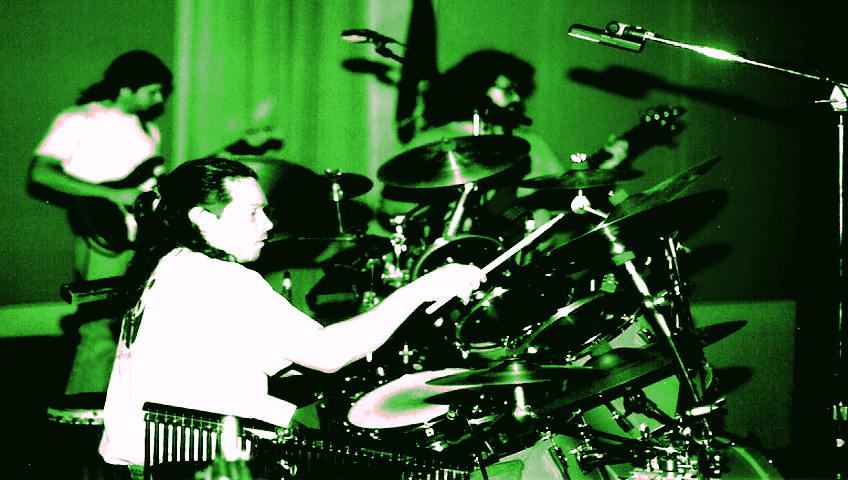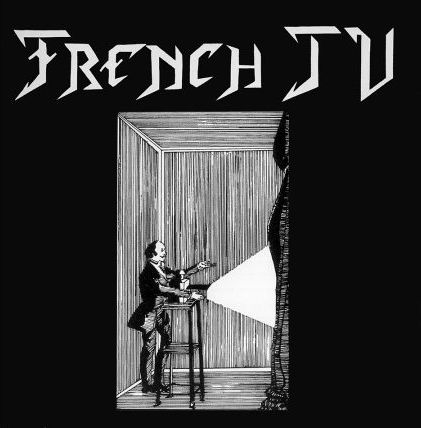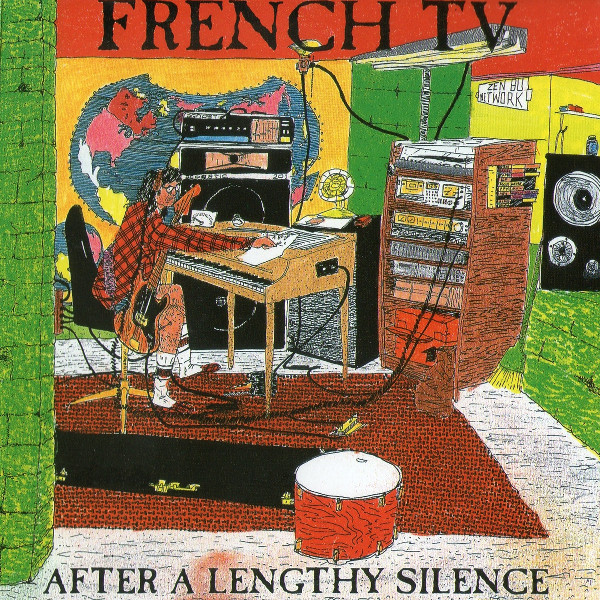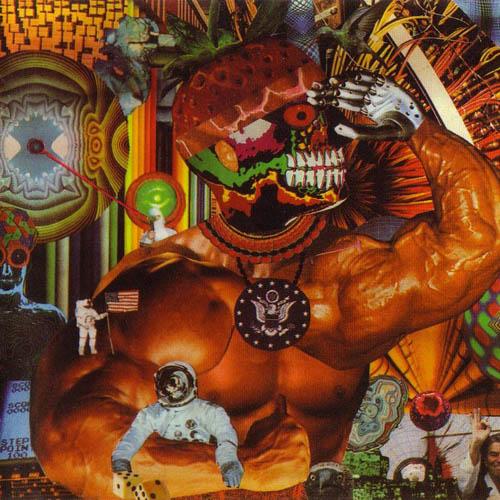
Exposé Online
What's old
Exposé print issues (1993-2011)
- 1 (October 1993)
- 2 (February 1994)
- 3 (May 1994)
- 4 (August 1994)
- 5 (October 1994)
- 6 (March 1995)
- 7 (July 1995)
- 8 (November 1995)
- 9 (March 1996)
- 10 (August 1996)
- 11 (February 1997)
- 12 (May 1997)
- 13 (October 1997)
- 14 (February 1998)
- 15 (July 1998)
- 16 (January 1999)
- 17 (April 1999)
- 18 (November 1999)
- 19 (May 2000)
- 20 (October 2000)
- 21 (March 2001)
- 22 (July 2001)
- 23 (December 2001)
- 24 (April 2002)
- 25 (September 2002)
- 26 (February 2003)
- 27 (August 2003)
- 28 (December 2003)
- 29 (April 2004)
- 30 (September 2004)
- 31 (March 2005)
- 32 (September 2005)
- 33 (May 2006)
- 34 (March 2007)
- 35 (January 2008)
- 36 (October 2008)
- 37 (July 2009)
- 38 (July 2010)
- 39 (Summer 2011)
Features
Lengthy Silence Punctuated By... —
A Profile of French TV 1996

An unlikely name for a collective of progressive musicians from Louisville, Kentucky, French TV is essentially bassist / bandleader Mike Sary and whoever he happens to be working with at any given point in time. From one album to the next, the high turnover rate in the lineup may, at first lead one to believe that French TV is more of a solo project — yet considering the time elapsed between recording of the band's four releases (nearly eight years in some cases), these are only snapshots of what has been a gradual change.
by Peter Thelen, Published 1996-03-01
The roots of the band date back to the early 80s, when Sary and co-founder Steve Roberts were members of another local band called Festung Amerika. When Festung called it a day, Sary and Roberts split off to concentrate on writing, and eventually forming their own band with two younger members, guitarist Artie Bratton and drummer Fenner Castner. “Originally I was the drummer for French TV,” Roberts explains, “just as I was the drummer for Festung America. We auditioned keyboard player after keyboard player, and although some of them were technically very good, they all sucked as composers! One day we auditioned a guitarist who fancied himself the next George Benson. He was very good but wanted to do soft jazz covers all the time! His name was Bo Castner. His little brother came along one night and played the shit out of my drums! I thought right then that we had to change our thinking, and I went out and bought a Roland keyboard and became the keyboard player in the group. Then Fenner brought his friend Artie along one night to jam on guitar and there was never any question about it, at the end of the first session we all just kinda said 'when do we get together next?' We all just started treating Artie as our guitarist from the minute he started playing.” Immediately they went to work on producing their first, eponymous LP, skipping the normal route of playing live and developing a following. That first album was released in early '83, in a pressing of 500 copies, produced by the band and distributed locally and via mail order. At the moment it is completely unavailable in any form.
 Stylistically, French TV covers a lot of territory, from an electrified instrumental Canterbury sound to fusion to free improvisation and more. The youthful energy of Bratton and Castner (from the photo on the album insert neither of these guys could be a day over sixteen) plays off the refined chops of Roberts and Sary, and the results are a unique blend of diverse influences — original and challenging enough to remain interesting after many listens, but accessible enough in some cases to follow the listener around all day. Two cases of the latter point are "Dream of Peace" and "The Artist's House," both penned by Roberts; they are catchy and melodic, and offer a refuge from some of the album's more abstract and challenging material. Speaking of which, "No Charge" is a lengthy free improv that wanders around a lot, but seldom gets off the ground for long. "Under Heaven There Is Great Disorder," penned by Sary, brings guest saxes into the band's mix. The album's gem, though, has to be "Earth, I Wait," a positively bizarre tune, sort of a quirky Spanish-meets-reggae number that sputters along with a few odd missing beats, graced by a splendid guest cello solo to boot.
Stylistically, French TV covers a lot of territory, from an electrified instrumental Canterbury sound to fusion to free improvisation and more. The youthful energy of Bratton and Castner (from the photo on the album insert neither of these guys could be a day over sixteen) plays off the refined chops of Roberts and Sary, and the results are a unique blend of diverse influences — original and challenging enough to remain interesting after many listens, but accessible enough in some cases to follow the listener around all day. Two cases of the latter point are "Dream of Peace" and "The Artist's House," both penned by Roberts; they are catchy and melodic, and offer a refuge from some of the album's more abstract and challenging material. Speaking of which, "No Charge" is a lengthy free improv that wanders around a lot, but seldom gets off the ground for long. "Under Heaven There Is Great Disorder," penned by Sary, brings guest saxes into the band's mix. The album's gem, though, has to be "Earth, I Wait," a positively bizarre tune, sort of a quirky Spanish-meets-reggae number that sputters along with a few odd missing beats, graced by a splendid guest cello solo to boot.
This would be Roberts' last recording with the band, though, citing business and family commitments as the main reason for leaving. Roberts explains: “The original lineup got together in the summer of ‘82, and in true prog style, disbanded about one year later.” Sary would continue to direct the band, writing all the material for their second album while remaining one of Louisville's best kept secrets — in fact the band never played a regular live gig until after their second album. During this period the band usually consisted of Sary, Bratton, and Castner — though the latter was away at college much of the time, and a variety of other players who came and went, some who were featured on the second and third albums, and others who were part of various live incarnations, among them Bill Fowler (piano), Clancy Dixon (saxes, clarinet), Bruce Krohmer (saxes, bass clarinet), Paul Nevitt (keyboards), Mike Buren (guitar), and Ondraus Cissell (drums, percussion).
 Three years after the first album, the appropriately titled and much anticipated After a Lengthy Silence was finally released, with Sary firmly at the helm. While the first album demonstrated the band's abilities in many areas, the second was far more focused and monolithic. The jazzy and RIO-ish tendencies of the first album, while not absent here, are subdued somewhat, as well as the overtly melodic. Instead, the music yields more to a directed jazz-rock style that is heavier and darker than previous explorations. On several of the tracks, but most noticeably on "Friendly Enzymes," Sary's bass playing takes on a zeuhl quality not unlike that of Jannick Top. I suspect that Helmut Hattler (Kraan) might also be an influence, given the freewheeling funkiness that permeates "You Fool! You Broke the Yolks!" The nine-minute "Vacilando" is another group improv, this one being far more consistent than the similar offering on the first album. While the oddly-timed "And the Dead Dog Leaped up and Flew around the Room" may at first hint of "Earth, I Wait" from the first album, it owes at least as much to Frank Zappa's synclavier work, and to the keyboard atmospherics of Happy the Man — and topped of with Browning's 'Angry Hornets' guitar solo, it comes close to being the album's best track. But that honor belongs to "Go Like This," which occupies the better part of the album's second side, working through many mood shifts and tempo changes, with plenty of energetic solos and dreamy passages, offering some evidence of Van der Graaf's influence. In all, it's a very different album than the first, but still unmistakably French TV.
Three years after the first album, the appropriately titled and much anticipated After a Lengthy Silence was finally released, with Sary firmly at the helm. While the first album demonstrated the band's abilities in many areas, the second was far more focused and monolithic. The jazzy and RIO-ish tendencies of the first album, while not absent here, are subdued somewhat, as well as the overtly melodic. Instead, the music yields more to a directed jazz-rock style that is heavier and darker than previous explorations. On several of the tracks, but most noticeably on "Friendly Enzymes," Sary's bass playing takes on a zeuhl quality not unlike that of Jannick Top. I suspect that Helmut Hattler (Kraan) might also be an influence, given the freewheeling funkiness that permeates "You Fool! You Broke the Yolks!" The nine-minute "Vacilando" is another group improv, this one being far more consistent than the similar offering on the first album. While the oddly-timed "And the Dead Dog Leaped up and Flew around the Room" may at first hint of "Earth, I Wait" from the first album, it owes at least as much to Frank Zappa's synclavier work, and to the keyboard atmospherics of Happy the Man — and topped of with Browning's 'Angry Hornets' guitar solo, it comes close to being the album's best track. But that honor belongs to "Go Like This," which occupies the better part of the album's second side, working through many mood shifts and tempo changes, with plenty of energetic solos and dreamy passages, offering some evidence of Van der Graaf's influence. In all, it's a very different album than the first, but still unmistakably French TV.
 Work on the third album began almost immediately after the second was finished, and continued through 1990, yet it wasn't released in a commercially available form until its CD release in '94. The lineup involves many of the same names that appeared on the second album — Sary, Castner, Bratton, Nevitt, Krohmer — plus some new names as well, offering some insight to the band's ongoing evolution. The music on Virtue in Futility blends elements of symphonic, fusion, RIO, Canterbury, and other styles, as well as Sary's sense of humor and left-of-center political leanings. Again, some reference points here might be Zappa, Hatfield, Bruford, Happy the Man, and Henry Cow — though the zeuhl tendencies so evident on the second are not so apparent here. This album was reviewed exhaustively in Exposé #5, so please refer there for more detail.
Work on the third album began almost immediately after the second was finished, and continued through 1990, yet it wasn't released in a commercially available form until its CD release in '94. The lineup involves many of the same names that appeared on the second album — Sary, Castner, Bratton, Nevitt, Krohmer — plus some new names as well, offering some insight to the band's ongoing evolution. The music on Virtue in Futility blends elements of symphonic, fusion, RIO, Canterbury, and other styles, as well as Sary's sense of humor and left-of-center political leanings. Again, some reference points here might be Zappa, Hatfield, Bruford, Happy the Man, and Henry Cow — though the zeuhl tendencies so evident on the second are not so apparent here. This album was reviewed exhaustively in Exposé #5, so please refer there for more detail.
Then the came the real lengthy silence. Between the last recordings for the third album the release of the fourth last year, the band experienced a near complete turnover in lineup, save Sary himself. Members were constantly coming and going. Sary notes, “At several points there were actually two bands — one doing the studio work, and another playing live gigs.” Even Roberts rejoined the band a few times for some live shows. “The best line-up was the ‘power trio’ version with myself, Dean Z and Jeff Mullen,” explains Sary. “We played a killer version of ‘Red,’ which inspired drunken women to dance! Really, Steve has it on video!” Brattan, who had never played with the live band, moved away and was replaced eventually by Tony Hall, while Castner — away at the university most of the year — was only able to play in the band a few months in the summer. Eventually he moved away also, and new permanent members were recruited.
 French TV today is Sary (bass, Chapman stick), John Robinson (keys), Dean Zigoris (guitars), and Bob Douglas (drums, vocals). Wait a minute... Vocals? Yes, after three albums of purely instrumental music, the latest album Intestinal Fortitude features six long tracks, three of which feature vocals — either by Douglas or Tony Hall, who played guitar on the album and contributed two songs. Are the vocals part of an effort to appeal to a wider audience? Douglas' Peter Hammill styled voice on "No Raven Tonight" is hardly one that would have any mass commercial appeal, but Sary explains that the only reason French TV never used vocals on past recordings was because there was nobody in the band who had a voice that was remotely tolerable. Again, the album features numerous guests on sax, flute, violin, and trumpet. Overall, the album is split 50/50 between the sort of Canterbury/fusion/RIO influenced material typically featured on FTV albums past — tracks like "Um Tut Sut" and "The Souls of the Damned Live in Failed Works" — mostly contributed by Sary, and the more direct progressive rock style of tracks like "Perseids" and "Black Day, White Light," contributed by guitarist Hall. Closing the album is a haunting cover of Van der Graaf's "Pioneers over C," featuring vocals by Douglas. This cut also appears on the Mellow Records VDGG tribute Eyewitness (see review elsewhere). In all, a good release that shows a band not afraid to move in some different directions.
French TV today is Sary (bass, Chapman stick), John Robinson (keys), Dean Zigoris (guitars), and Bob Douglas (drums, vocals). Wait a minute... Vocals? Yes, after three albums of purely instrumental music, the latest album Intestinal Fortitude features six long tracks, three of which feature vocals — either by Douglas or Tony Hall, who played guitar on the album and contributed two songs. Are the vocals part of an effort to appeal to a wider audience? Douglas' Peter Hammill styled voice on "No Raven Tonight" is hardly one that would have any mass commercial appeal, but Sary explains that the only reason French TV never used vocals on past recordings was because there was nobody in the band who had a voice that was remotely tolerable. Again, the album features numerous guests on sax, flute, violin, and trumpet. Overall, the album is split 50/50 between the sort of Canterbury/fusion/RIO influenced material typically featured on FTV albums past — tracks like "Um Tut Sut" and "The Souls of the Damned Live in Failed Works" — mostly contributed by Sary, and the more direct progressive rock style of tracks like "Perseids" and "Black Day, White Light," contributed by guitarist Hall. Closing the album is a haunting cover of Van der Graaf's "Pioneers over C," featuring vocals by Douglas. This cut also appears on the Mellow Records VDGG tribute Eyewitness (see review elsewhere). In all, a good release that shows a band not afraid to move in some different directions.
So what's next for French TV? Sary plans to release a live album recorded earlier this year. “We’ve finally gotten around to recording a recent gig at a theater with a sixteen track digital board. The sound quality ought to be pretty good. I hope to put it out this spring.” Hopefully that will include their energized cover of Shadowfax' "New Electric India" that this writer heard on a live tape recorded last year, as well as some of the original material that has yet to make the studio releases. Meanwhile, Mellow Records will be reissuing the first two albums, the second to include a cover of Nektar’s “A Tab in the Ocean” by the Sary-Bratton-Castner lineup as a bonus track. Beyond that, all the material for the next studio album is written, and rehearsals are in progress. Expect a release in early '97.
Filed under: Profiles, Issue 9
Related artist(s): French TV
What's new
These are the most recent changes made to artists, releases, and articles.
- Review: The Adelaidean - Nine Breaths
Published 2026-02-15 - Release: Maledictis - Echoes of Consciousness
Updated 2026-02-14 23:32:42 - Artist: Maledictis
Updated 2026-02-14 23:26:54 - Release: Falter Bramnk - Vinyland Odyssee
Updated 2026-02-14 00:25:55 - Review: Pier Niccolò "Bambi" Fossati - ...Il Castello Tira Sassi...
Published 2026-02-14 - Review: Balloons for the Dog - Wicked Forms of Old Snow
Published 2026-02-13 - Release: Evergrey - Architects of a New Weave
Updated 2026-02-12 19:15:23 - Release: Richard Barbieri - Hauntings
Updated 2026-02-12 19:13:57 - Release: Major Parkinson - Valesa II: Viva the Apocalypse!
Updated 2026-02-12 19:11:44 - Review: Michael Brückner - A Sequence of Colours
Published 2026-02-12 - Release: Tenk Van Dool / Paul Sears - Basal Ardor
Updated 2026-02-11 23:59:30 - Release: Craig Padilla & Marvin Allen - Unfolding Skies
Updated 2026-02-11 23:53:32 - Review: Michael Moorcock & the Deep Fix - The New Worlds Fair (50th Anniversary Edition)
Published 2026-02-11 - Listen and discover: Take flight with Steve Roach
Published 2026-02-10 - Review: Denman Maroney Quintet - Umwelt
Published 2026-02-10 - Review: Ubiks - Ciudad Sumergida
Published 2026-02-09 - Release: Fabio Anile - Minutiae
Updated 2026-02-08 00:46:44 - Artist: Fabio Anile
Updated 2026-02-08 00:42:58 - Review: Schizo Fun Addict - Pasteline Dream
Published 2026-02-08 - Release: Tom Salvatori - Lullaby for Jude
Updated 2026-02-07 19:52:27
